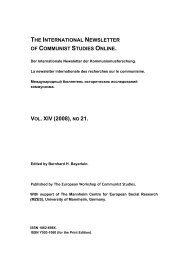11RXNdQ
11RXNdQ
11RXNdQ
Create successful ePaper yourself
Turn your PDF publications into a flip-book with our unique Google optimized e-Paper software.
The Political Thought of Patrice Lumumba* 91<br />
Lumumba drew his powerful sense of pride from his post, the education he had received,<br />
the books he had read, from the vaguely deferential mistrust with which the whites<br />
surrounded him. When he talked later about the benefits of colonization, he was thinking<br />
about this extraordinary and common metamorphosis.<br />
But his consciousness is twofold and contradictory: at the same time as he was<br />
enjoying his rise and the benevolent regard of his bosses, he was aware that he had, at the<br />
age of 20, reached his zenith. Above all the blacks, he would always remain beneath all<br />
the whites. Of course, he could earn more and, after an apprenticeship, become a thirdclass<br />
postal worker in Stanleyville. So what? For the same work, a Belgian clerk of equal<br />
merit would earn twice his salary. In addition, Lumumba knew that after a thundering<br />
start, the hare had suddenly turned into a tortoise: it would take him 24 years to reach first<br />
class, after which he would stay there until retirement. The European, in contrast, entered<br />
this junior rank directly, and could aspire to rise from there to the highest positions. It<br />
was the same in the Force Publique: a ‘Negro’ could not rise above the rank of sergeant.<br />
It was also the same in the private sector. The whites had raised him to the level they<br />
wished and then kept him there: his fate was in other people’s hands. He experienced his<br />
condition with a sense of pride and alienation. Beyond his personal situation he caught a<br />
glimpse of naked class war; at 31, he was to write: ‘A real duel exists between the<br />
employers and the employees with regard to salaries.’ But the salaried class of évolués<br />
was not the proletariat: Lumumba’s demands were based on the awareness of his<br />
professional worth – like those of the anarcho-syndicalists in Europe at the end of the last<br />
century – and not on need which motivates the demands of proletarians and the subproletariat<br />
everywhere. At about the same time, he realized – above all in Léopoldville –<br />
that he had been duped: the ‘registration’ that had been so hard to obtain separated him<br />
from the blacks without assimilating him to the whites. The registered black had no more<br />
right than the unregistered to enter European towns, unless he was working there; like<br />
them, he could not evade the curfew; when he went shopping, he met them again at the<br />
special counter reserved for blacks; like them, he was a victim of segregationist practices<br />
on every occasion and in every place. Now it should be noted that racism and segregation<br />
were a new experience for him: in the bush, one experiences adversity and malnutrition,<br />
and one is able to guess at that truth of the colonies, which is exploitation; but racism<br />
scarcely appears owing to a lack of contact between whites and blacks. The honeyed<br />
paternalism of the missionaries may have deluded him; the practices of discrimination<br />
only became evident in the towns and that is what made up the daily life of the colonized.<br />
But let us be clear about it: the exhausted and underpaid proletariat suffered much more<br />
from exploitation than from racist discrimination which is the consequence of it. When,<br />
on 30 June 1960, Lumumba denounced ‘the exhausting work required in exchange for<br />
wages which did not allow us to eat our fill, or to clothe and house ourselves decently, or<br />
to raise our children’, he was speaking for everyone. But when he added: ‘We knew that<br />
in the towns there were magnificent houses for the whites and crumbling grass huts for<br />
the blacks, that a black was never allowed into the so-called European cinemas,<br />
restaurants or shops; that a black travelled in the hull of the barges beneath the feet of the<br />
white in his luxury cabin’, it is the évolué class speaking through his voice. And when he<br />
wrote in 1956 that ‘registration should be considered as the last stage of integration’, he<br />
was defending the interests of a handful of men and at the same time was contributing to




